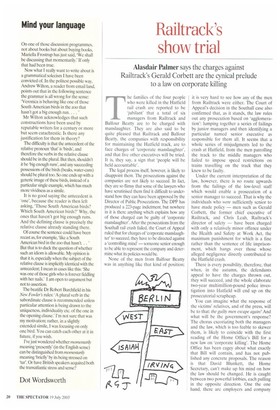Mind your language
On one of those discussion programmes, not about books but about buying books, Marietta Frostrup has just said, 'We shall be discussing that momentarily.' If only that had been true.
Now what I really want to write about is a grammatical solecism I have been convicted of. In the politest possible way, Andrew Wilton, a reader from email land, points out that in the following sentence the grammar is all wrong for the sense: 'Veronica is behaving like one of those South American birds in the zoo that hasn't got a big enough run. . . . '
Mr Wilton acknowledges that such constructions have been used by reputable writers for a century or more but seem catachrestic. Is there any justification for them in theory?
The difficulty is that the antecedent of the relative pronoun 'that' is 'birds', and therefore the verbs in the relative clause should be in the plural. But then, shouldn't it be 'big enough runs', and any succeeding possessions of the birds (beaks, water-cans) should be plural too. So one ends up with a generic image of these birds, instead of a particular single example, which has much more vividness as a simile.
It is no good saying the antecedent is 'one', because the reader is then left asking, 'Those South American birds? Which South American birds?' Why, the ones that haven't got big enough runs. And the defining clause is precisely the relative clause already standing there.
Of course the sentence could have been recast as, for example, 'like a South American bird in the zoo that hasn't. . . ' But that is to duck the question of whether such an idiom is allowable. My opinion is that it is, especially when the subject of the relative clause is implicitly identical with the antecedent; I mean in cases like this: She was one of those girls who is forever fiddling with her nails.' I am open to argument but not to assertion.
The beatific Dr Robert Burchfield in his New Fowler's rules: 'A plural verb in the subordinate clause is recommended unless particular attention is being drawn to the uniqueness, individuality etc. of the one in the opening clause.' I'm not sure that was my motivation; rather, in a slightly extended simile, I was focusing on only one bird. You can catch each other at it in future, if you wish.
I've just wondered whether momentarily meaning 'presently' (in the English sense) can be distinguished from momentarily meaning 'briefly' by its being stressed on 'tar'. Or have British speakers acquired both the transatlantic stress and sense?
Dot Wordsworth


























































 Previous page
Previous page